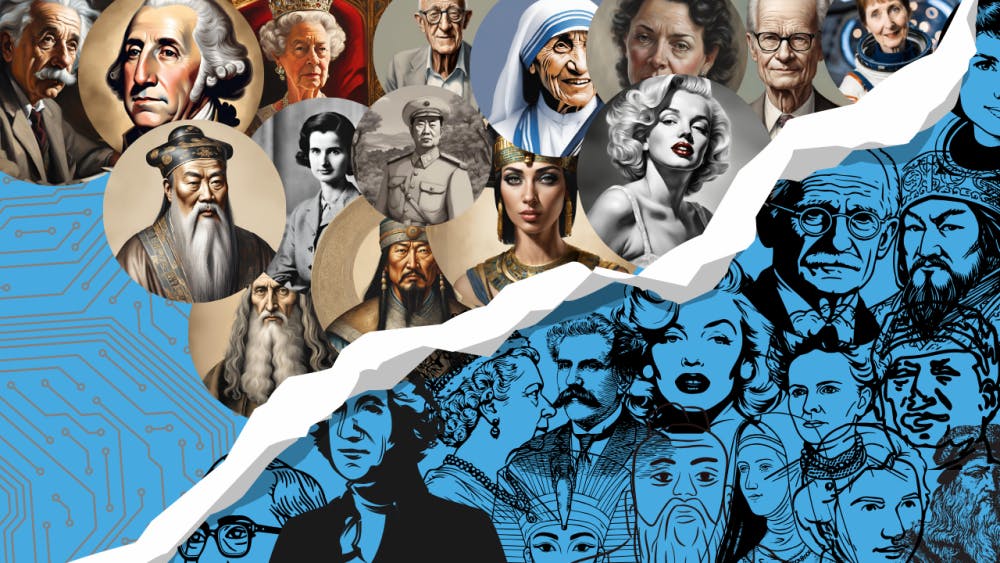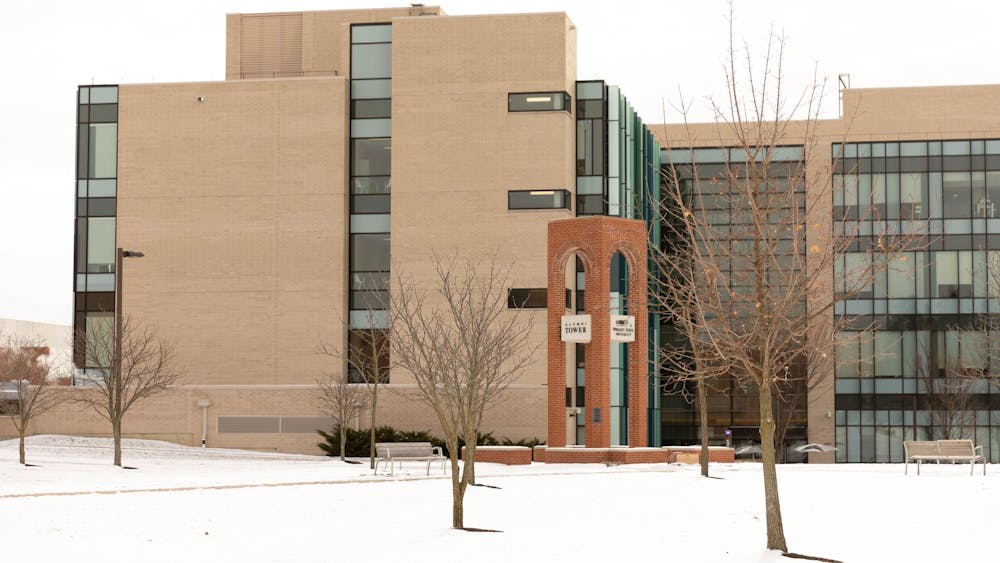AI Talk | Graphic by Rose Taylor | The Wright State Guardian
Angus Fletcher, a professor of humanities at The Ohio State University, hosted a seminar at the Creative Arts Center to discuss the fundamental difference between the human brain and artificial intelligence– and why this difference means AI will never replace humanity.
The cost of artificial intelligence
Fletcher started off the presentation with a question many people ask: “Is artificial intelligence going to save us from ourselves? Or is it going to eliminate us?”
“Well, what I’m gonna try to convince you of this talk is that neither of those is going to be the case. And underlying this is my claim that AI is mechanically incapable of replicating human intelligence,” Fletcher said.
He went on to explain that the human brain is much more complex than a computer can ever be, thanks to the animal neuron, and that this complexity allows for more paths and opportunities of thought and action than what a computer can create.
Fletcher has a professional background in neurophysiology and has spent years at the University of Michigan Medical School studying individual neurons. He also has been in the field of artificial intelligence for nearly a decade.
Artificial intelligence is a repeating, scaled operation of one specific logical pattern. This pattern needs to repeat thousands or even millions of times for AI to properly function.
“Whereas the human brain is a really weird smorgasbord of different things… There’s a huge amount of physiological variety in the human brain. That complexity is important,” Fletcher explained.
The human brain has evolved over centuries of unpredictable environments; it has developed to where it is built to run on low information in a world where something that worked yesterday is not going to work today. It has developed capacities to work with little or no information at its disposal.
AI, on the other hand, needs data to function. It relies on constant information and data to actually work; so much data, in fact, that the cost of using AI is skyrocketing with each passing day. The cost of training these systems alone can cost an unimaginable amount of power.
James Vincent, a reporter from The Verge, states that the cost to train AI models like ChatGPT is roughly the amount of power annually consumed by 130 U.S. homes.
“To put that in context, streaming an hour of Netflix requires around 0.8 kWh (0.0008 MWh) of electricity. That means you’d have to watch [Netflix for 1.625 million] hours to consume the same amount of power it takes to train GPT-3,” Vincent said.
How our school system is affected
In modern times, many in the U.S. say that the school system is ineffective. According to Gallup, Americans’ satisfaction rate with the U.S. school system is down to merely 36%. The graph provided on Gallup’s website shows that this satisfaction rate was at its second-highest in 2019, but has continued to grow worse as the years pass.
Fletcher says that this lack of satisfaction– as well as the general inability to adapt in modern times– is due to the data-centric education system.
“We’ve never had a harder time adapting. Why is that? That’s because we’re building school systems that are focused almost entirely on data, data, data, and not enough… on the things that we have in the humanities,” Fletcher explained.
As we become more obsessed with artificial intelligence, the more we try to become artificial intelligence.
The real beauty of the human brain, however, lies in the narrative that humans are able to tell. Fletcher explains the concept perfectly.
“Most of human intelligence is being able to say ‘you know what would be smart right now?’ And doing this thing and that thing. To create original plans, make original sequences of action, to tell original stories in your mind about things that haven’t happened yet, and then make them true,” Fletcher said.
“That’s why science fiction becomes real science, because you tell the story, and then you make the story happen.”
Also, unlike AI, humans have common sense. Even children have common sense, but this concept is something that is impossible for AI to understand. It also does not have emotional intelligence. These concepts are such an important part of humanity, but AI cannot recreate it.
Imagination is another concept that humans have that AI does not.
“The main thing I want you to take away from this talk is the purpose of the humanities is to expose us to human environments where the rules of life are different,” Fletcher ended.
How the arts are affected
Despite the fact that the core of humanity comes from our creativity, many people devalue or ignore the hard work that artists put into creating their works of art.
In the Q&A session that followed his seminar, one student asked about the current big issue of AI: generative AI that is creating artistic images based off of thousands of human artist’s works. This has been a prevalent issue in art communities for years now.
“Generative AI is actually theft,” Fletcher stated. “I mean, it’s a bizarre form of sanctioned plagiarism… It’s important to remember that everything that is generative AI is stolen from human intelligence, and that these systems are not capable of creating anything on their own. So that’s a great reminder of just how dependent they are on humans,” Fletcher answered.
For those concerned on how the current path of generative AI is looking– whether it will replace human artists and, most important, their jobs– Fletcher provides a logical reason to not be worried.
“Basically, AI is kind of like a toy. It’s fun to play with, but it’s not going to be globalizing,” Fletcher said. “Everything we have is a part of our imagination. So keep faith that it’s going to work out.”
While it may seem far in the future now, there will always be a time in history where humans respect other human’s art– not stolen recreations that are the result of many trying to find ways to create free and easy artworks.
Haven Smith, a social work major, agrees that generative AI is a harmful force in society right now.
“I think AI generated art can be useful in very specific ways, but when it’s abused it’s harmful. It can be really good for inspiration, but typically that isn’t what people use it for. The majority of the time, it’s harmful in a way where people use it in order to try to replace actual artist’s work,” Smith said.
Where to learn more
Fletcher’s presentation was full of information that would take dozens of pages to properly portray to those who did not attend the event on Thursday. He provided detail on the importance of imagination and being creative in places many people would not expect, like the U.S. military. He also explained diversion thinking and convergent thinking.
Many people, especially the U.S. army, are researching concepts like creativity, common sense and narrative thinking. To learn more about this– as well as Fletcher’s seminar on the human brain compared to AI– students can read Fletcher’s work here.







